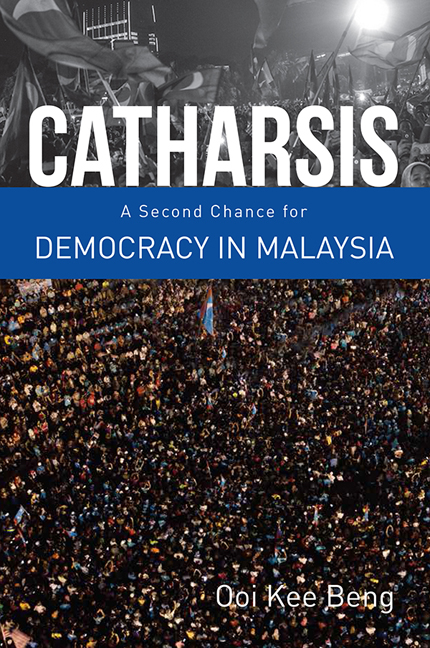Book contents
- Frontmatter
- Contents
- Foreword
- 1 Introduction – Malaysia's Future Is Redeemed
- Before Pakatan Harapan
- Before 9 May 2018
- 12 Racialising the Un-racialisable: What Is the Red Shirt Rally All About?
- 13 One Country's Merdeka Is Another's Damage Control
- 14 Malaysia – Where Politics Must Be Ethnically Inclusive and Exclusive at the Same Time
- 15 Is Malaysia at a Crossroads or in a Quagmire?
- 16 Unity Without Solidarity Sows Disunity
- 17 UMNO and Looking Back at History
- 18 Sarawak Forces Federal Opposition to Do Deep Soul-searching. But Can It?
- 19 By-elections Reveal New Malay Politics
- 20 Interview with Mahathir Mohamad: ‘People Must Be Able to Hold Their Heads Up.’
- 21 Malaysia Has to Start Re-examining Its Histories
- 22 Waves from US Probe into 1MDB May Turn into Tsunami
- 23 Seeking a New Formula to Unite Malaysia's Diversity
- 24 Time for Anwar to Accept Mahathir's Olive Branch?
- 25 Najib, Mahathir and the Timing of Malaysia's Polls
- 26 Excessive Governance Is Not Good Governance
- 27 Why Malaysia's Opposition Will Take to the Streets Again
- 28 Merdeka is About The Individual, Too
- 29 A Battle Between Malay Leaders Over Malaysia's Future
- 30 The Primacy of Political Economy in Asia
- With Mahathir at the Helm
- Beyond 9 May 2018
- About the Author
30 - The Primacy of Political Economy in Asia
from Before 9 May 2018
Published online by Cambridge University Press: 12 February 2019
- Frontmatter
- Contents
- Foreword
- 1 Introduction – Malaysia's Future Is Redeemed
- Before Pakatan Harapan
- Before 9 May 2018
- 12 Racialising the Un-racialisable: What Is the Red Shirt Rally All About?
- 13 One Country's Merdeka Is Another's Damage Control
- 14 Malaysia – Where Politics Must Be Ethnically Inclusive and Exclusive at the Same Time
- 15 Is Malaysia at a Crossroads or in a Quagmire?
- 16 Unity Without Solidarity Sows Disunity
- 17 UMNO and Looking Back at History
- 18 Sarawak Forces Federal Opposition to Do Deep Soul-searching. But Can It?
- 19 By-elections Reveal New Malay Politics
- 20 Interview with Mahathir Mohamad: ‘People Must Be Able to Hold Their Heads Up.’
- 21 Malaysia Has to Start Re-examining Its Histories
- 22 Waves from US Probe into 1MDB May Turn into Tsunami
- 23 Seeking a New Formula to Unite Malaysia's Diversity
- 24 Time for Anwar to Accept Mahathir's Olive Branch?
- 25 Najib, Mahathir and the Timing of Malaysia's Polls
- 26 Excessive Governance Is Not Good Governance
- 27 Why Malaysia's Opposition Will Take to the Streets Again
- 28 Merdeka is About The Individual, Too
- 29 A Battle Between Malay Leaders Over Malaysia's Future
- 30 The Primacy of Political Economy in Asia
- With Mahathir at the Helm
- Beyond 9 May 2018
- About the Author
Summary
It is a complicated subject, this thing we call Economics. I do not always know what it means.
I remember once talking to Robert Kuok about it. His reply was (and I paraphrase from my vague memory of that conversation): ‘Economics is simply about living, isn't it? As you live, you learn to live – that is economic knowledge’.
That is the gist of what I understood from what he said. I offer my apologies if I misunderstood his point. But what I understood then made sense to me. In fact, his description comes very close to the original meaning of the term. ‘Economics’ has Greek origins, coming from the word okionomia, which means ‘household management’.
However, no household exists by itself, and so Economics cannot be about the management of a single household. It has to deal with the management of multiple households. The existence of multiple households means politics, of course. Therefore, when the subject of Economics emerged as a distinct modern field of study, it went under the title of ‘political economy’. Such was the case when Scottish economists Adam Smith (1723–90) and David Hume (1711–76) and the French thinker Francois Quesnay (1694–1774) made their greatest contributions by using systematic and secular terms to explain the creation and maintenance of wealth by studying the complex interactions between political, social, economic and technological factors.
Since then, Economics as an academic discipline has branched out in many directions and there is really no definition of Economics today that anyone calling himself an economist agrees on. One can see why. If the focus is on the individual household, then we see how Smith's notion of ‘the Invisible Hand’ can argue how the collective effect of self-interest also serves the common good. For some, this approach ignores the state a little too much and disregards what we today see as a central tenet of political and economic studies – National Interests.
The preference for the individual in understanding economics was further undermined by Karl Marx (1818–83), who put forth powerful arguments that economic trends and dynamics are best understood as part and parcel of an unending class struggle within any societal form.
- Type
- Chapter
- Information
- CatharsisA Second Chance for Democracy in Malaysia, pp. 105 - 108Publisher: ISEAS–Yusof Ishak InstitutePrint publication year: 2018

